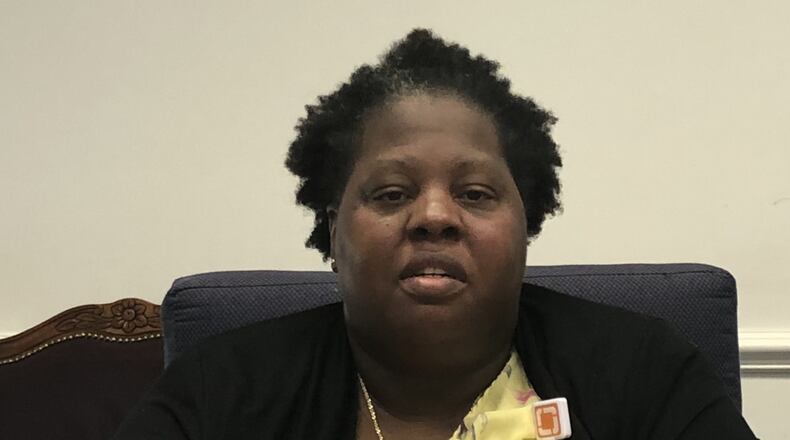When Jacopa Johnson began her first day on the job last month, she thought in no time, she and her family would be moving from cramped quarters at her father-in-law’s house in Macon to their own residence in Henry County. What she didn’t realize is that she wouldn’t have money coming in for nearly a month.
Not wanting to rely on social services, Johnson was determined to turn the situation around on her own. But her struggle illustrates one of the ironic truths about being homeless: Although pulling one’s self up by the bootstraps is an admirable quality, it’s not a practical way to move out of homelessness.
“Although I know we had a lot of road to cover, it didn’t dawn on me how much it costs to get everyone where they need to be,” said Johnson. “I’m not used to asking for things. I’d rather do odd jobs to make money than to ask strangers to take care of me and my family.”
Even with assistance, it takes most people six months to a year or more to get out of the grip of homelessness and poverty, said Protip Biswas, vice president of homeless for The United Way of Greater Atlanta. Even with a job, they may not be making a living wage, he said. Additional job training may be difficult with a family, but that’s one of the services United Way’s partner agencies try to help with.
Johnson did start a GoFundMe account to help in the short-term with gas for the family's only car as well as money for a deposit on a rental place. It hasn't received much attention, and Johnson said she sees it as a sign to power on with her original plan.
“If people that know me aren’t donating then I feel sure that no one else will,” she said. “I can’t say that I’m shocked because I never ask anyone for anything. I’m going to do what I always do and provide for my own.”
Rising out of homelessness is “not impossible to do on your own,” said Biswas, “but it’s not necessary when there are so many people who want to help. There are a variety of agencies across the region that are designed to help.”
Every day Johnson drives her kids from Macon to McDonough for school and takes herself to Piedmont Healthcare in Conyers where she works as a nurse. She then drives back to McDonough to pick up the kids and they all head back to Macon for the night. The round trip is about 150 miles, which costs about $30 daily for gas. She said she says a prayer every morning that no flat tires or mechanical issues throw another kink in the plan.
Her suit against Henry County argues that a federal law that allows homeless students to remain in the school they attended before becoming homeless applies to their situation. To keep stability in the boys’ lives, she wanted them to remain in the school system they’ve been attending for four years. One graduates this year and the other has special needs.
“It will be hard to do all this running around, but it’s the right thing to do for my children,” said Johnson.
The kids don’t receive free lunch or transportation assistance. The family hasn’t applied for food stamps or government-backed housing assistance. Her husband, disabled in the past year, is awaiting a hearing in December to determine if he qualifies for Supplemental Security Income, a federal government program that provides money and health care coverage to people with low income and limited assets who are 65 or older, blind or disabled.
Johnson's struggle is not unique. The homeless rate was what pushed Atlanta to No. 4 in a 2017 ranking of "neediest cities" by the financial website WalletHub, after Detroit, Brownsville, Texas; and Memphis.
The Atlanta Center for Self-Sufficiency, a group offering services to the needy, says 16 percent of about 7,000 homeless people in metro Atlanta are in homeless families.
Although change doesn’t come overnight, United Way data show that the metro homeless count has decreased nearly 40 percent since 2011. The United Way’s 212 partner agencies assist with basic needs, education, health, homelessness, life skills, substance abuse, income and a lot of other issues in 13 metro counties.
State Department of Education data show that the number of homeless students fluctuates greatly from year to year, but statewide numbers have increased steadily from more than 36,000 in 2013-2014 to a projected 40,000-plus in 2018-2019.
As the state’s largest school district, Gwinnett County has seen numbers decrease from 2,511 in 2013-2014 to 1,922 in 2017-2018. Officials credit much of the decline to an increased effort by teachers and staff to recognize students who may be homeless.
Atlanta Public Schools has seen fluctuations in the past five years. Recent years have seen a high in 2015-2016 of 3,088 while in 2016-2017 the number had decreased to 1,977.
Biswas said the loss of self-reliance is hard for many people who eventually seek out help.
“There’s no shame in needing a helping hand,” he said. “I’m surprised (Mrs. Johnson) is doing as well as she is. Homelessness is a complex situation and there are many big barriers to success. There’s no need to suffer to prove a point.”
HOW TO HELP
Jocopa Johnson has started a GoFundMe account to raise money for transportation and to help with a deposit and first month’s rent on a permanent residence.
Information: www.gofundme.com/2395cw-home-and-transportation
MORE DETAILS
Data from the state Department of Education show that the number of homeless students throughout Georgia, which fluctuates from year to year, has gone from more than 36,000 in 2013-2014 to a projected 40,000-plus in 2018-2019.
About the Author
Keep Reading
The Latest
Featured


